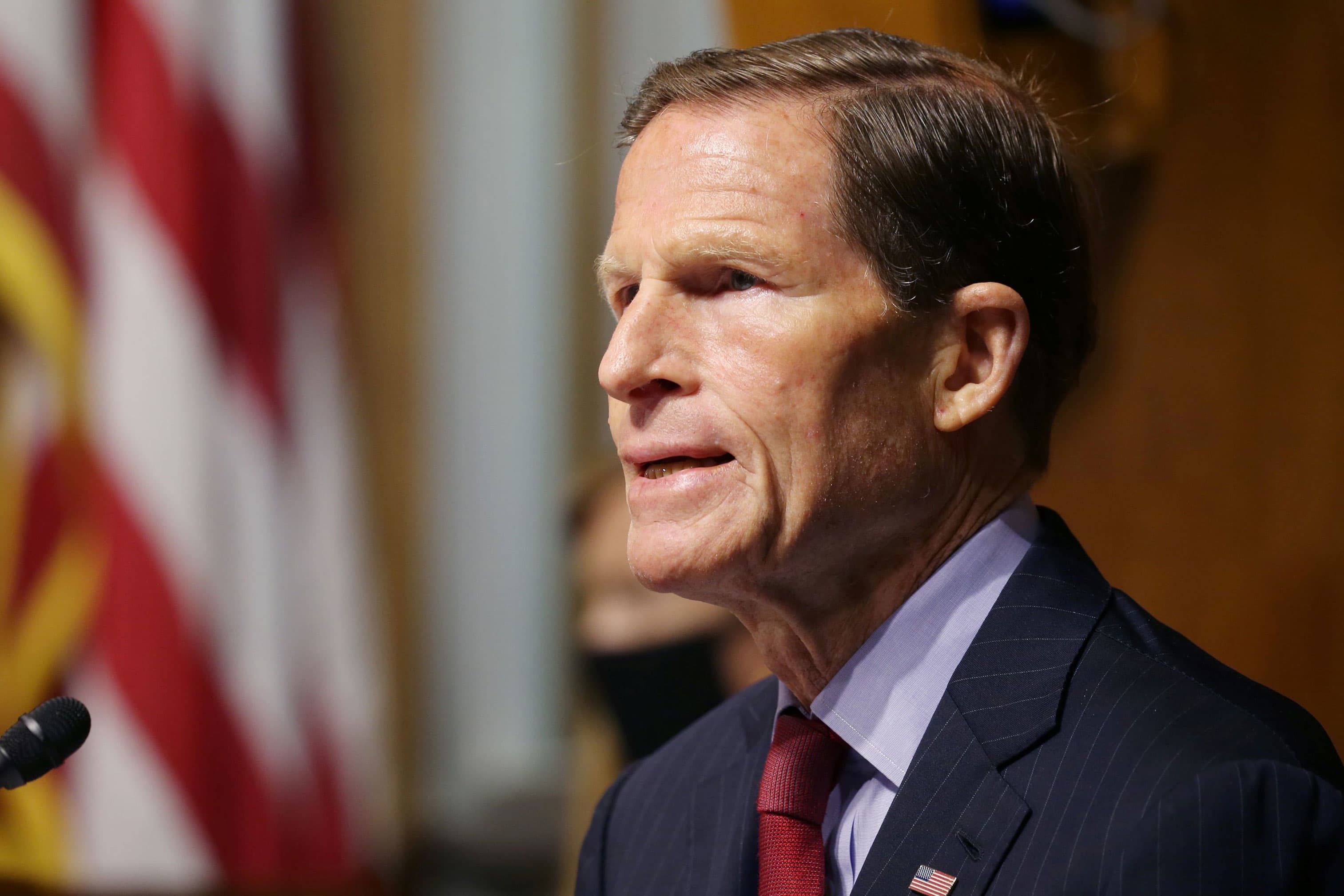Lawmakers send clear message to Facebook: don’t build Instagram kids
[ad_1]
Senator Richard Blumenthal, D-CT, asks questions during a hearing of the Senate Judiciary Subcommittee on Privacy, Technology and the Law, at the United States Capitol in Washington DC on 27 April 2021.
Tasos Katopodis | Swimming pool | Reuters
WASHINGTON – Facebook’s testimony to members of the US Senate on Thursday led to a damning conclusion from lawmakers in attendance: Instagram doesn’t have to create an app for kids.
Using Facebook’s own internal research from documents leaked to the Wall Street Journal and some eventually published by the company, Senators sharpened their pre-existing criticisms of the company and expressed concern about its effects on young people.
In its series, the Journal detailed Facebook’s plan to create an Instagram service for children under 13. One of the stories described an internal company slideshow from 2019, claiming that Instagram made one in three teenage girls’ body problems worse.
While Facebook touted the Instagram plan as an alternative and safer app for children than its flagship product, lawmakers repeatedly expressed deep skepticism to Antigone Davis, Facebook’s global head of safety, during his testimony on Thursday. .
Senator Richard Blumenthal, D-Conn., Who chairs the Senate Trade Subcommittee on Consumer Protection, told reporters ahead of the hearing that although Facebook said it would put its plans on hold, “they should undertake to put an end to it definitively “.
“If we’re dealing with the real world of Facebook, where the guarantees are more illusory than real, there shouldn’t be Instagram for kids, period,†said Blumenthal, whose committee held the hearing. “If they really cared about child safety, if there was concrete evidence of that, I might think differently. But Instagram for Kids is clearly the same thing.”
Facebook posted an annotated version of part of Instagram’s slideshow the day before the hearing. The company wrote that its earlier formulation of the research figure “may be sensationalistic of the negative impact on the graph” and even “ignore potentially positive interpretations – for example, more than half of respondents say Instagram is improving. their feeling of loneliness. “
Davis tried to contextualize and reframe the research in the Journal’s reports, but senators reminded him that the data came from Facebook’s own studies. They also presented him with quotes from other internal documents which they said were provided by the whistleblower.
Davis said the research was “not a bomb.” Lawmakers vehemently disagreed.
“For parents who lose their children, it’s a bomb in their life,†said Sen. Ted Cruz, R-Texas. He referenced an internal research statistic reported by the Journal showing that among teens who reported suicidal thoughts, 6% of US users surveyed attributed the feelings to Instagram.
“This research is a bomb,” Blumenthal said at the hearing. “This is powerful, startling and fascinating proof that Facebook knows about the harmful effects of its site on children and that it has hidden these facts and findings.”
Seeing is believing
Facebook said after the Journal series that its reports chose data and lacked critical context. In response to a request for comment Thursday, the company flagged two earlier blog posts on the Journal report.
Blumenthal said her staff conducted their own experiment, creating a profile identified as a 13-year-old girl and following accounts associated with “extreme diet and eating disorders.” He said that “in one day his recommendations were exclusively filled with stories promoting self-harm and eating disorders.”
Outside the courtroom, Senator Amy Klobuchar, D-Minn., Told reporters she was “disappointed” with Davis’ responses.
“Anyone who’s studied Facebook and really looked at the profit model, how the business got started, how they make money… it’s all based on the use of their users’ data,†Klobuchar said. “It’s all a profit model, it’s a game. A profit game.”
Klobuchar said she was keen to see Facebook’s written responses on how it earns younger users compared to other demographics.
Blumenthal told CNBC in an interview later Thursday that the whistleblower’s revelations were reminiscent of what happened to the tobacco industry decades earlier.
“The Big Tobacco analogy is very telling because when we sued Big Tobacco we thought they knew their products were harmful,†said Blumenthal, expanding on the comments he provided in his opening statement. “And their own records showed that they knew that. In fact, they had studies that showed it. So the analogy is very apt.”
He added that technology and tobacco “incorporate addiction into their business model” and have tried to hook children into products to “replenish their customer base.”
Senator Ed Markey, D-Mass., Made the same comparison.
“Instagram is that first childhood cigarette meant to get teens hooked early on, harnessing the peer pressure of popularity and ultimately putting their health at risk,†Markey said.
Few friends in Washington
Representative Lori Trahan, D-Mass., A vocal opponent of Instagram for children and an advocate for children’s online safety, told CNBC in an interview that recent disclosures make Facebook’s promises even harder to crack. trust.
“How can we believe that they are going to design an Instagram for children when they have not knowingly fixed their main platform, knowing what we know today in terms of danger to young people?” said Trahan. “So Instagram for kids was a bad idea until last week. It’s an even worse idea now.”
All lawmakers who polled Facebook on Thursday expressed concern and urgency over the documents they had seen. This is a rare glimpse of what bipartisanship looks like in today’s Washington, DC.
“There is no partisan difference,” Blumenthal told reporters outside the courtroom. “And I might add that there is no sympathy for Facebook for its inability to act responsibly.”
Subscribe to CNBC on YouTube.
WATCH: Instagram’s Mosseri talks about new features and antitrust issues
[ad_2]

